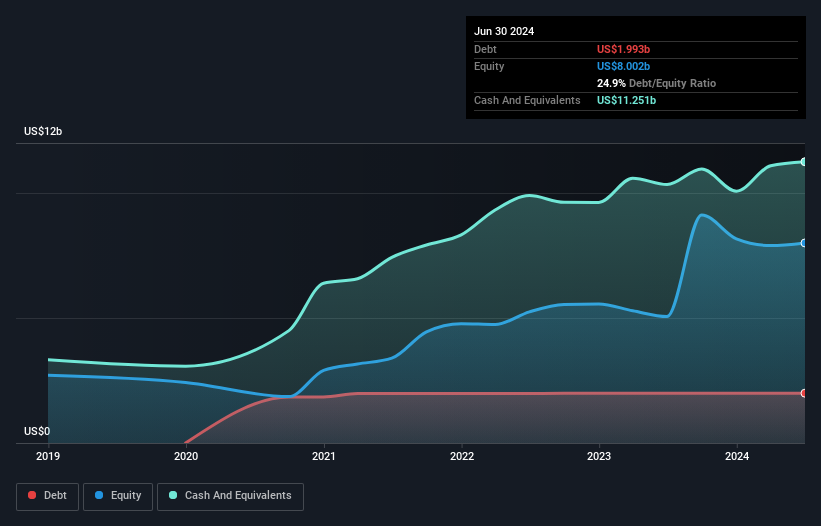- United States
- /
- Hospitality
- /
- NasdaqGS:ABNB
These 4 Measures Indicate That Airbnb (NASDAQ:ABNB) Is Using Debt Reasonably Well
David Iben put it well when he said, 'Volatility is not a risk we care about. What we care about is avoiding the permanent loss of capital.' When we think about how risky a company is, we always like to look at its use of debt, since debt overload can lead to ruin. We can see that Airbnb, Inc. (NASDAQ:ABNB) does use debt in its business. But should shareholders be worried about its use of debt?
When Is Debt Dangerous?
Generally speaking, debt only becomes a real problem when a company can't easily pay it off, either by raising capital or with its own cash flow. If things get really bad, the lenders can take control of the business. However, a more frequent (but still costly) occurrence is where a company must issue shares at bargain-basement prices, permanently diluting shareholders, just to shore up its balance sheet. Of course, debt can be an important tool in businesses, particularly capital heavy businesses. When we examine debt levels, we first consider both cash and debt levels, together.
See our latest analysis for Airbnb
What Is Airbnb's Net Debt?
The chart below, which you can click on for greater detail, shows that Airbnb had US$1.99b in debt in June 2024; about the same as the year before. However, its balance sheet shows it holds US$11.3b in cash, so it actually has US$9.26b net cash.

How Strong Is Airbnb's Balance Sheet?
According to the last reported balance sheet, Airbnb had liabilities of US$15.8b due within 12 months, and liabilities of US$2.49b due beyond 12 months. Offsetting these obligations, it had cash of US$11.3b as well as receivables valued at US$175.0m due within 12 months. So its liabilities outweigh the sum of its cash and (near-term) receivables by US$6.89b.
Since publicly traded Airbnb shares are worth a very impressive total of US$81.6b, it seems unlikely that this level of liabilities would be a major threat. But there are sufficient liabilities that we would certainly recommend shareholders continue to monitor the balance sheet, going forward. Despite its noteworthy liabilities, Airbnb boasts net cash, so it's fair to say it does not have a heavy debt load!
On the other hand, Airbnb's EBIT dived 18%, over the last year. If that rate of decline in earnings continues, the company could find itself in a tight spot. There's no doubt that we learn most about debt from the balance sheet. But it is future earnings, more than anything, that will determine Airbnb's ability to maintain a healthy balance sheet going forward. So if you want to see what the professionals think, you might find this free report on analyst profit forecasts to be interesting.
Finally, a company can only pay off debt with cold hard cash, not accounting profits. Airbnb may have net cash on the balance sheet, but it is still interesting to look at how well the business converts its earnings before interest and tax (EBIT) to free cash flow, because that will influence both its need for, and its capacity to manage debt. Over the last three years, Airbnb actually produced more free cash flow than EBIT. That sort of strong cash conversion gets us as excited as the crowd when the beat drops at a Daft Punk concert.
Summing Up
While it is always sensible to look at a company's total liabilities, it is very reassuring that Airbnb has US$9.26b in net cash. The cherry on top was that in converted 227% of that EBIT to free cash flow, bringing in US$4.4b. So we don't have any problem with Airbnb's use of debt. There's no doubt that we learn most about debt from the balance sheet. However, not all investment risk resides within the balance sheet - far from it. Case in point: We've spotted 2 warning signs for Airbnb you should be aware of, and 1 of them is concerning.
If, after all that, you're more interested in a fast growing company with a rock-solid balance sheet, then check out our list of net cash growth stocks without delay.
New: Manage All Your Stock Portfolios in One Place
We've created the ultimate portfolio companion for stock investors, and it's free.
• Connect an unlimited number of Portfolios and see your total in one currency
• Be alerted to new Warning Signs or Risks via email or mobile
• Track the Fair Value of your stocks
Have feedback on this article? Concerned about the content? Get in touch with us directly. Alternatively, email editorial-team (at) simplywallst.com.
This article by Simply Wall St is general in nature. We provide commentary based on historical data and analyst forecasts only using an unbiased methodology and our articles are not intended to be financial advice. It does not constitute a recommendation to buy or sell any stock, and does not take account of your objectives, or your financial situation. We aim to bring you long-term focused analysis driven by fundamental data. Note that our analysis may not factor in the latest price-sensitive company announcements or qualitative material. Simply Wall St has no position in any stocks mentioned.
About NasdaqGS:ABNB
Airbnb
Operates a platform that enables hosts to offer stays and experiences to guests worldwide.
Flawless balance sheet and good value.
Similar Companies
Market Insights
Community Narratives





